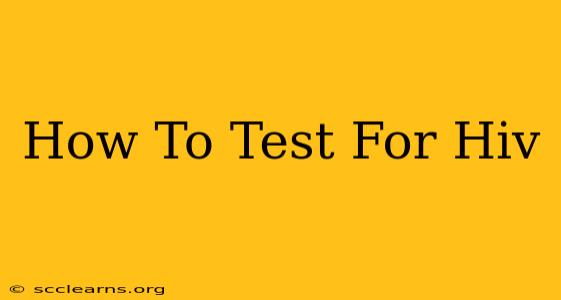Knowing your HIV status is crucial for your health and well-being. Early diagnosis allows for prompt treatment, significantly improving quality of life and preventing transmission. This guide provides comprehensive information on how to get tested for HIV.
Understanding HIV Testing
HIV (Human Immunodeficiency Virus) is a virus that attacks the body's immune system. If left untreated, it can lead to AIDS (Acquired Immunodeficiency Syndrome). Fortunately, HIV testing is readily available and relatively simple. Several different types of tests exist, each with its own advantages and disadvantages.
Types of HIV Tests
-
Antibody Tests: These tests detect antibodies your body produces in response to the HIV virus. They are the most common type of HIV test and can be performed using various methods:
- Blood tests: A simple blood draw is required. This is typically the most accurate method.
- Oral fluid tests: These tests use a swab to collect saliva. They are convenient and becoming increasingly popular.
- Home tests: These tests allow you to collect a sample at home and mail it to a lab for testing. Results are generally available online.
-
Antigen/Antibody Tests: These tests detect both HIV antibodies and HIV antigens (parts of the virus itself). They can detect HIV infection earlier than antibody tests alone. These are often rapid tests.
-
Nucleic Acid Tests (NAT): These tests directly detect the HIV virus's genetic material. NAT tests are highly sensitive and can detect HIV infection very early, even before antibodies are produced. However, they are generally more expensive and not as widely available as antibody tests.
Where to Get Tested for HIV
Many options exist for HIV testing, ensuring accessibility for everyone:
- Doctor's Office or Clinic: Your healthcare provider can perform an HIV test and discuss the results with you. They can also offer counseling and guidance.
- Community Health Centers: Many community health centers provide free or low-cost HIV testing and related services.
- Testing Centers: Dedicated testing centers offer confidential and anonymous HIV testing.
- Hospitals: Most hospitals offer HIV testing services.
- Home Testing Kits: These are available for purchase online or at some pharmacies.
Choosing the Right Testing Method
The best HIV test for you depends on your individual circumstances and preferences. Factors to consider include:
- Accuracy: Blood tests are generally the most accurate.
- Convenience: Oral fluid tests and home tests offer greater convenience.
- Cost: Some tests are free, while others may incur a cost.
- Anonymity: Anonymous testing options are available if you prefer not to disclose your identity.
- Turnaround Time: Rapid tests provide results within minutes, while others may take several days.
Understanding Your HIV Test Results
After your test, it's crucial to understand what the results mean:
- Positive Result: A positive result indicates the presence of HIV antibodies or antigens. It's essential to seek medical attention immediately to begin treatment. Your doctor will discuss treatment options and provide support.
- Negative Result: A negative result means that the test did not detect HIV. However, it's important to remember that a negative result doesn't guarantee you are completely free from HIV, particularly if you have recently engaged in risky behavior. Regular testing is recommended.
- Inconclusive Result: In rare cases, a test may yield an inconclusive result. This usually means that more testing is needed.
Prevention and Risk Reduction
Regardless of your HIV status, practicing safe sex and other preventative measures is vital. These measures include:
- Consistent Condom Use: Using condoms correctly and consistently during sexual activity significantly reduces the risk of HIV transmission.
- Pre-Exposure Prophylaxis (PrEP): PrEP is a medication that can significantly reduce the risk of HIV infection for people who are at high risk.
- Post-Exposure Prophylaxis (PEP): PEP is a medication that can reduce the risk of HIV infection after a potential exposure. It must be started within 72 hours of exposure.
- Needle Exchange Programs: For individuals who use intravenous drugs, needle exchange programs provide clean needles and syringes to prevent the transmission of HIV and other bloodborne infections.
Getting tested for HIV is a simple, crucial step towards protecting your health. Don't delay; take control of your health and get tested today. Remember, early detection and treatment are key to living a long and healthy life with HIV.

